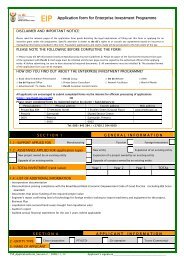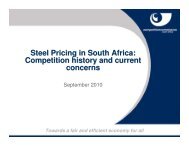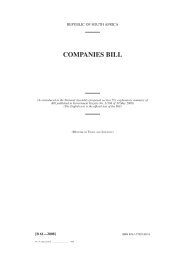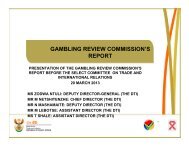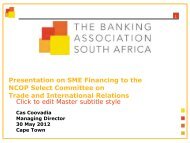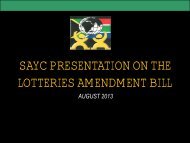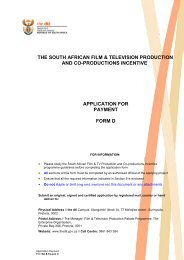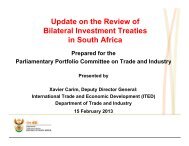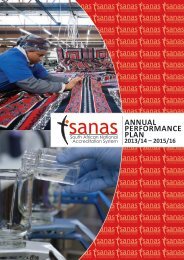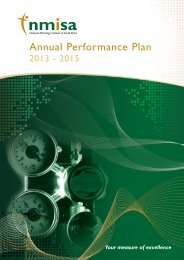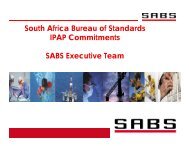The implementation of this law led to the present two-tier system existing in Brazil. ECAD shall be referred to, in thisdocument, as a collecting society, while the copyright societies shall be called Collective Management Associations (CMA).1.4.3. STRUCTURE OF ECADECAD is a non-profit civil institution created exclusively to meet the needs of the associations. ECAD is run by a GeneralAssembly, which consists of managing directors of the different associations responsible for the public performance of music.ECAD, with its headquarters in Rio de Janeiro, has 25 collecting units, 780 employees, 45 lawyers, 130 service providers<strong>and</strong> 130 autonomous agencies as service providers located in all Brazilian states. It has a fully centralised computerisedsystem, which has 342 000 owners of works registered with 2,4 million works <strong>and</strong> 862 000 phonograms, which account for allregistered versions of each song. The music users of copyright works total 418 000 in the register of ECAD (Annual <strong>Report</strong>,ABRAMUS, 2009).The General Assembly meets every month. Its decisions are taken through voting, which are weighted according to themarket share of each society. However, most decisions are taken by consensus (Gloria Braga, interview, May 2011).The ECAD collects, whereas the association acts as a bridge, supplying information to ECAD (Gustav Gonsales interview,ABRAMUS, May 2011). The associations are responsible for documenting the repertoire of their represented rights holders inthe database of ECAD, centralising information of the rights holders from all associations.The amounts fixed on ECAD’s price list correspond to different types of user <strong>and</strong> usage. The user is any individual orcompany who uses music through public broadcast. The amount of money collected by ECAD (minus 25% administrativecosts) is passed on to the copyright owners.Brazil does not have one society per right, but rather there is one bureau that collects for all 10 associations <strong>and</strong> distributesto all the constituent associations on the basis of their repertoires.According to Ms Barbosa, Director of Intellectual Property Office in the Ministry of Culture, CMAs in Brazil are different fromthose in other countries, because they have composers, record companies, performers <strong>and</strong> authors all in one association(Ms Barbosa, Director of Intellectual Property, Ministry of Culture, interview, June 2011).There is no limit to the number of CMAs that can exist simultaneously. The minimum requirements for setting up a collectingsociety are determined by Civil <strong>Law</strong> <strong>and</strong> the only other requirement is that they must have rights holders as members.1.5. EFFECTIVENESS OF THE STRUCTURE OF THE ASSOCIATIONS CONCERNINGDISTRIBUTION OF AUTHORS’ RIGHTSIn terms of effectiveness, the existence of a central structure for collections allows for the associations to act consensually interms of setting tariffs <strong>and</strong> distribution. This rules out competition among the different associations on the basis of tariffscharged to users. With the collection function off their h<strong>and</strong>s, CMAs have greater capacity to improve their data-capturingsystems (developing their own software) <strong>and</strong> training their staff to provide good service to their members.- 124 -
There is healthy competition among associations as members are free to join any society or to move from one association toanother as long as they inform the society they are leaving. This competition provides incentives for associations to provide abetter service. Newly developed software gives instant <strong>and</strong> consistent feedback to ECAD as well as to member associations<strong>and</strong> members. Although there are no limits on the establishments of new associations, small associations are not sustainabledue to the technological infrastructure required to run an association successfully (Gustav Gonsalez, interview, ABRAMUS,May, 2011).The lack of competition among associations on tariff setting has led some critics to accuse ECAD of abusing its monopoly.On the matter of fraud, there have been allegations, defences <strong>and</strong> counter allegations. Recently, allegations of fraud withinECAD have led to a parliamentary enquiry. In its defence, ECAD responded by putting out a public statement on its websitethat ECAD is no different from any other organisation where individuals sometimes transgress. However, it is claimed thatwhenever a single act of fraud is detected, it is politically exploited by ECAD’s critics <strong>and</strong> large user corporations, such ascable television. (http://respostadoecad.ecad.org.br 2011/06/11)1.6. COLLECTION OF ROYALTIESTypes of agreements between collecting societies <strong>and</strong> users: There are no blanket licences given <strong>and</strong> royalties are onlycollected for the works of members according to information given by users. There are no differences between the private<strong>and</strong> public broadcasters’ obligation to pay royalties, rather different tariffs are charged. Collection from all the users is donecentrally by ECAD. ECAD collects on the behalf of the associations <strong>and</strong> provides the mechanism for representatives ofdifferent associations to reach consensus <strong>and</strong> make collective decisions. ECAD collects only for members of CollectiveManagement Societies <strong>and</strong> for members of foreign societies with whom local associations have agreements. There is thusno issue of non-members’ royalties.The amount collected has increased on an annual basis by more than 10% since the 1990s. In 1996, the collections of ECADrose by 14% to $68 million. Payments from television stations accounted for 21% of the total, <strong>and</strong> radio stations for 14%.General use payments represented 24% of the total. Payments from the cinema sector was only 0,3%. Over the years,ECAD has become more efficient, increasing rates of collection from users <strong>and</strong> distribution to associations, directly benefitingcomposers, performers, musicians, record labels <strong>and</strong> music publishers. Collections in 2006 of R$268 368 828,00 increasedin 2007 to R$302 206 444, which increased in 2008 to R$332 298 825,06, which, in turn increased to R$374 255 580 in 2009<strong>and</strong> R$432 953 853 in 2010. In four years, the revenue of ECAD increased 38%.Royalties are collected at different times from different users <strong>and</strong> distributed to the associations on a monthly basis to ensurea regular income for rights owners.Use of cue sheets by some or all users <strong>and</strong> the alternatives: Where manual cue sheets are used, the data is processedelectronically by the associations. This applies to domestic as well as international data. Associations maintain a goodelectronic database. The accuracy of music usage information is ensured through an auditing process. ECAD <strong>and</strong> theassociations are in an ongoing process of developing better software to measure usage directly. Composers, publishers,performers <strong>and</strong> recording companies are beneficiaries of royalties collected for the performance <strong>and</strong> reproduction of sound- 125 -
- Page 2 and 3:
TABLE OF CONTENTSLIST OF ABBREVIATI
- Page 4 and 5:
11.8 RECOMMENDATIONS ..............
- Page 6 and 7:
LIST OF TABLESTable 1: Cases of Non
- Page 8 and 9:
NORMOSPsPOSAPPLPPL (India)ProLitter
- Page 10 and 11:
These problems are addressed in the
- Page 12 and 13:
xxi.The report considers developmen
- Page 14 and 15:
1.3.8. Determine whether all money
- Page 16 and 17:
1.4.9. The CRC derived considerable
- Page 18 and 19:
2.3 SUBMISSION BY THE DEPARTMENT OF
- Page 20 and 21:
Aspects of Intellectual Property Ri
- Page 22 and 23:
(1) Subject to the provisions of th
- Page 24 and 25:
Copyright Tribunal or an arbitrator
- Page 26 and 27:
society, the South African Recordin
- Page 28 and 29:
3.2.14. With the liquidation of SAR
- Page 30 and 31:
the final rate or rates to be appli
- Page 32 and 33:
(a)that payment is to be made to th
- Page 34 and 35:
information as to their use to enab
- Page 36 and 37:
The WCT and WPPT oblige members to
- Page 38 and 39:
Once the handset technology changed
- Page 40 and 41:
4.3.16. In 2009, in what was coined
- Page 42 and 43:
4.4.6. In exchange for the above li
- Page 44 and 45:
operators are licensed by NORM to p
- Page 46 and 47:
5.2 FUNCTIONING OF COLLECTING SOCIE
- Page 48 and 49:
the grant of licences. Article 17 o
- Page 50 and 51:
6.1.3. The CRC’s assessment of th
- Page 52 and 53:
6.3.3. SAMPRA should be given one y
- Page 54 and 55:
Corporate Governance GapsKing II Re
- Page 56 and 57:
King IIIPrincipleKing IIIRequiremen
- Page 58 and 59:
King IIIPrincipleKing IIIRequiremen
- Page 60 and 61:
8 COLLECTION OF MUSIC ROYALTIES8.1
- Page 62 and 63:
8.1.4.2. Needletime royalties are n
- Page 64 and 65:
8.1.7.4. For the past five years, V
- Page 66 and 67:
PRS (UK)SPRE (FRANCE)SUISA(SWITZERL
- Page 68 and 69:
DetailsPerformance RightsSound Reco
- Page 70 and 71:
8.2.7 Comparative Study Performed b
- Page 72 and 73:
y a collecting society. A rights ho
- Page 74 and 75:
agency, its rights being derived fr
- Page 76 and 77:
Mr Robinson said DALRO assumed the
- Page 78 and 79:
10.1.6. The distribution to publish
- Page 80 and 81: 10.4.4. Most of the other collectin
- Page 82 and 83: 10.6.3.4. South African English-lis
- Page 84 and 85: 10.10 CONTRACTUAL RELATIONSHIPS BET
- Page 86 and 87: 10.12.2. The Regulations should rec
- Page 88 and 89: licence that the licensee comply wi
- Page 90 and 91: 11.4.6. The details of ICASA’s ta
- Page 92 and 93: RecommendationsTimelines for Recomm
- Page 94 and 95: enterprises. There was a suggestion
- Page 96 and 97: Copyright as it relates to copyrigh
- Page 98 and 99: 13.4 DEPARTMENT OF ARTS AND CULTURE
- Page 100 and 101: Table 28: Comparative Study’s Key
- Page 102 and 103: KEY ITEMS BRAZIL FRANCE INDIA NORWA
- Page 104 and 105: KEY ITEMS BRAZIL FRANCE INDIA NORWA
- Page 106 and 107: about 30%, which is the highest amo
- Page 108 and 109: 15.1.3. The Copyright Tribunal’s
- Page 110 and 111: 15.1.20. Local music content requir
- Page 112 and 113: for the selected artists. The outco
- Page 114 and 115: King III Report by Institute of Dir
- Page 116 and 117: Paranagua Pedro, “Strategies to I
- Page 118 and 119: Copyright Amendment Act of 1984Copy
- Page 120 and 121: APPENDIX 1(B): SUMMARY OF ORAL REPR
- Page 122 and 123: Due to the fact that the existing c
- Page 124 and 125: Mr BrottelProtection of copyright m
- Page 126 and 127: 1.1.3. LIST OF ENTITIES VISITED AND
- Page 128 and 129: In the 2009 Annual Report of ABRAMU
- Page 132 and 133: ecordings. In respect of audio-visu
- Page 134 and 135: In 1995, ECAD distributed 72% of it
- Page 136 and 137: niches in the market to ensure fair
- Page 138 and 139: Proprietary rights allow authors to
- Page 140 and 141: International royalty distribution
- Page 142 and 143: 3.2. Relevant LegislationsThe prese
- Page 144 and 145: IPRS uses the standard tariffs in r
- Page 146 and 147: Ad-hoc workshops on copyright are c
- Page 148 and 149: meaningful living out of their crea
- Page 150 and 151: 4.1.3. LICENSING AND LEGAL REGIMESI
- Page 152 and 153: Ballet teachers; Teachers in the fi
- Page 154 and 155: It was founded in 1928 by the Norwe
- Page 156 and 157: 6.2. STRUCTURE OF COLLECTING SOCIET
- Page 158 and 159: 6.5. COLLECTION OF MUSIC ROYALTIEST
- Page 160 and 161: 1957, when the Managing Director of
- Page 162 and 163: 16.4.14 SWISSPERFORM: CHF4 millionI
- Page 164 and 165: Cross-border licensing of digital r
- Page 166 and 167: algorithm could be used to determin
- Page 168 and 169: Collecting societies in the UK all
- Page 170 and 171: APPENDIX 3: RECOMMENDATIONS BY MITT
- Page 172 and 173: 1.PREAMBLEThe Music Industry Task T
- Page 174 and 175: The environment in which the music
- Page 176 and 177: 3.1.3 IMPLEMENTATION AND ACCESSION
- Page 178 and 179: In this regard, the Minister should
- Page 180 and 181:
3.5.6 OMBUDSMANThe music industry s
- Page 182 and 183:
RECOMMENDATION 23:The MITT recommen
- Page 184 and 185:
The MITT further recommends that DA
- Page 186 and 187:
APPENDIX 4A: EXTRACTS FROM COPYRIGH
- Page 188 and 189:
(f)(g)doing, in relation to an adap
- Page 190 and 191:
(i)requiring notice of any intended
- Page 192 and 193:
(b)any organization claiming to be
- Page 194 and 195:
PERFORMERS’ PROTECTION ACTNO. 11
- Page 196 and 197:
the parties may agree to refer the
- Page 198 and 199:
- 192 -
- Page 200 and 201:
- 194 -
- Page 202 and 203:
- 196 -
- Page 204 and 205:
- 198 -
- Page 206 and 207:
ANNEXURE 5: COPY OF SARRAL’S CONT
- Page 208 and 209:
- 202 -
- Page 210 and 211:
ANNEXURE 6: SARRAL’S AUDIT REPORT
- Page 212 and 213:
- 206 -
- Page 214 and 215:
TERMS OF REFERENCESNO’SREQUIREMEN
- Page 216 and 217:
TERMS OF REFERENCESNO’SREQUIREMEN
- Page 218 and 219:
TERMS OF REFERENCESNO’SREQUIREMEN
- Page 220 and 221:
TERMS OF REFERENCESNO’SREQUIREMEN
- Page 222 and 223:
TERMS OF REFERENCESNO’SREQUIREMEN
- Page 224:
- 218 -



